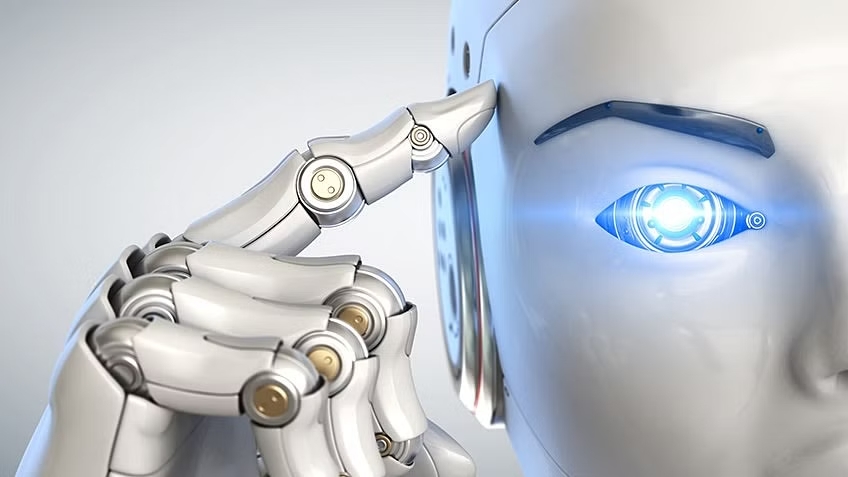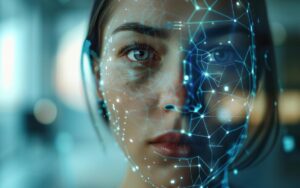With the popularity of AI programs like Midjourney and ChatGPT, artificial intelligence (AI) has gotten much attention in the news lately. And many are curious about who is creating these time-changing inventions.
The answer? AI engineers.
A job title born in the 1950s, AI engineering encompasses those who create AI technologies.
But what does that entail exactly?
In this post, we will dig into the AI engineer job description to help you understand what a career in AI engineering looks like and if it is something you might be interested in pursuing through an online AI/ML course.
What Is an AI Engineer?
AI engineers are software engineers who specialize in artificial intelligence. This involves programming, data engineering, data science, and software development skills. In the real world, this role involves blending AI and software development to bring a more software-forward focus to the AI field.
AI engineer job descriptions detail that this role involves being at the forefront of technological advances that help us fulfill the dreams of self-driving cars, fully automated factories, automated art and writing, and more.
Also Read: What Artificial Intelligence Engineer Salary Can You Expect?
AI Engineer Roles and Responsibilities
An AI engineer job description involves overseeing the entire life cycle of an AI program: the research, design, implementation, testing, and delivery. In a more detailed view, it involves the following:
Gather and Clean Data
Artificial intelligence relies on good data to help it learn and work smoothly. So AI engineers gather the correct data and clean it to ensure it is a viable input for machine learning (ML) models. Models are just programs that are trained to learn patterns in data.
Build AI Models
AI engineer job descriptions typically mention that engineers must know how to choose and experiment with machine learning models to accomplish specific business purposes. This involves feeding models, training data, and experimenting with different types of information, models, and configurations to see which models produce better results.
Create Software
The difference between an AI researcher and an AI engineer is that engineers focus on the practical usage of the product. From a business perspective, a model is only as good as its usage by clients, and AI engineers create software that helps users interact with AI models. This can be APIs, SaaS products, or other services.
Communication Between Business and Tech Teams
AI engineers also exercise social and communication skills by coordinating and explaining AI concepts and designs to business and tech teams. They are there to ensure everyone is on the same page.
Why Are AI Engineers Important?
AI is a technological beast, requiring deep knowledge in all things AI, logic, programming, and data, which not all software or data engineers have. AI engineers are specialized in their field and, therefore, are the most equipped to deal with issues specific to AI.
It is the same as the difference between a generalist and a specialist. In the medical field, a family doctor may know the symptoms of common ailments. But a specialist, like an endocrinologist or dermatologist, will know the most and best about their field for more specific issues. The same goes for the computer science field.
The Difference Between AI and Machine Learning
Artificial intelligence, or AI, is one of the core fields of computer science and includes subfields like machine learning (ML), neural networks, robotics, natural language processing (NLP), and others. The main difference is where AI falls in the hierarchy tree compared to ML. In this case, ML fits under the umbrella of AI.
The field of AI encapsulates any technology whose goal is to mimic the human brain and all of its capabilities, like logical thinking, problem-solving, and other behaviors, such as having intelligent conversations.
ML is the technique computers use to learn things without being explicitly programmed. Machine learning can be divided into three types of learning: supervised, unsupervised, and reinforcement learning.
Supervised Learning
Supervised learning is when data engineers feed labeled data to a model to “train” it to recognize patterns so that it accurately labels future data on its own.
A prime example of this is image recognition. You can have a machine recognize human faces by training it by feeding it thousands of labeled photos of humans and non-humans. Then in the real world, the machine will use its model to determine whether the image it sees is human.
Unsupervised Learning
Unsupervised learning is training a machine to recognize patterns independently — for example, sending a computer hundreds of photos of animals and letting the machine determine how it wants to categorize them. It might categorize all furry animals as one group and all winged animals as another. Rather than the mammal vs. reptile category humans make, the machine may differentiate by some other category.
Reinforcement Learning
Reinforcement learning is a type of learning where the computer must learn how to achieve a result. A good example of reinforcement learning is when a robot is given actions it can take to maximize its rewards and receives positive or negative reinforcement resulting from its actions. Eventually, the robot will learn what it needs to do to get more positive reinforcement, thus “learning” its techniques and patterns to increase its reward.
Also Read: What are Today’s Top Ten AI Technologies?
What Do AI Engineers Actually Do?
A typical day in the life of an AI engineer will start with a team meeting about what they have done and will need to do and then separating to work on their current project.
AI engineers are in charge of the entire life cycle of an AI program. That involves creating a design for said AI program, which involves the ability to explain AI concepts to business and product people with less technological backgrounds. It also involves problem-solving and logical thinking that you will use to research, implement, and test the product and then deliver it to the stakeholders.
Is Artificial Intelligence a Good Career?
Like all careers, AI has highlights and drawbacks you should know before determining if this path is right for you.
Pros of AI Engineering as a Career
High Salaries
As of 2025, Glassdoor shows that AI engineers in the US make anywhere between $124K and $193K. Therefore, a career in AI is financially lucrative and has room to grow in wages throughout your career.
Growing Industry/Job Prospects
According to Statista, the AI market revenue is expected to grow from $71 billion in 2023 to $126 billion in 2025. And top companies like Google, Microsoft, IBM, and Samsung have invested heavily in AI. With this kind of growth, the demand for AI engineers will grow, so you can expect jobs to be available during your career.
Opportunities for Growth
Because of AI’s reputation as a fast-growing and forward-thinking industry, opportunities for growth in your career and skill set are marked with the same upward trajectory. There will be many problems to solve, keeping you engaged and learning.
Flexible Workspace
Whether you want to work from home or not, this is a great career that gives you flexibility because all you need is a computer and internet connection, and you can do most of your work from anywhere. More and more companies have adopted WFH or hybrid policies for tech employees because of this flexibility.
Cons of AI Engineering as a Career
Sedentary Lifestyle Creep
Like any office job, you will spend a lot of time on the computer, which can create health problems if you do not exercise, walk, and occasionally peel your eyes away from the screen.
Keeping Up With Changing Times
The pro of a growing industry is lots of opportunities and growth. The downside is that because it is developing, it will be changing, and you will have to keep up your skills to adapt to newer, changing technologies. Like every industry, there will be disruptions and challenges. You must always be willing to learn new skills, which can be exciting to some but also require more work.
Also Read: The Future of AI: A Comprehensive Guide
How Can You Get Into Artificial Intelligence?
There are many avenues to get into artificial intelligence, but all can be categorized into three main paths below.
Bachelor’s Degree
Most universities and colleges offer programs that teach foundational computer science and other electives to build a foundation.
Pros of Getting a Bachelor’s Degree
- Good foundational knowledge you can take anywhere. With a structured learning plan, you won’t have knowledge gaps that might hinder you in the future.
- Being with like-minded peers and having a “college” experience. You will be surprised how much you can learn by being surrounded by people learning the same thing as you, which can also lead to future networking opportunities.
- Many AI engineer job descriptions require you to have at least a bachelor’s degree in computer science, computer engineering, or mathematics or equivalent experience.
Cons of Getting a Bachelor’s Degree
- The cost of higher education is exceptionally high, and with the current student loan debt crisis, this investment will be something you will be paying off for a long time.
- Four-year programs might be too slow and are usually full-time, meaning you’ll have to devote a lot of time to this career, which may not be viable for everyone. Some programs have part-time options, but finishing will take even longer.
- Some universities don’t offer a specialization in AI. Still, a blanket curriculum exposes you to everything suitable for your education but is time-consuming if you only want to learn AI-related things.
Self-Teaching
Technically, you can teach yourself the skills needed to be an AI engineer. Using YouTube and building your projects is an option you may enjoy if you are a self-starter and don’t need anyone else to keep you accountable.
Pros of Self-Teaching
- Free
- Completely flexible to learn on your own time
Cons of Self-Teaching
- No accountability: Only you will be responsible for your learning and progression
- You don’t know what you don’t know; it’s hard to learn something you are unaware of, which could lead to gaps in essential foundational knowledge.
- Some companies may not accept projects to vouch for your skills and may want more accredited proof of your skills, like a degree, certification, or completion of a reputable program.
Private Courses or Bootcamps
These AI courses can come in the form of bootcamps and courses from private companies specializing in teaching AI and other ComSci fields or accelerated programs from universities or colleges that can give you certifications, associate degrees, and job networking opportunities.
Pros of Online Courses
- Significantly cheaper than university degree programs
- Keeps you accountable with a structured curriculum to give you the base knowledge you need for a long-term career
- Usually online, so you don’t need to leave the comfort of your own home
- It can be full or part-time, so it is flexible to your lifestyle, budget, and goals
Cons of Online Courses
- Not all programs are created equal: You’ll need to do your research and look at social proof (reviews, job success rates after program completion, and course offerings)
- Not as reputable as bachelor’s degree candidates in the industry unless they come from a reputable program with hands-on experience
Also Read: How Does AI Work? A Beginner’s Guide
Important AI Industry Job Titles
The AI industry has many other job roles other than AI engineering. Here are just a few you can look into further:
- Machine learning engineer
- Data scientist
- Artificial intelligence researcher
- Robotics scientist
- AI research scientist
- Software engineer/developer
AI Engineer Skill Set
AI engineer job descriptions always mention specific skill sets companies want their candidates to have. Below are the ones most mentioned.
Coding
Knowing programming languages like Python, Java, C++, and R is essential for AI Engineers. You’ll want to focus on backend programming languages popular for data and backend software engineers to keep your skills fresh and relevant.
Data
Knowing how to work with databases (NoSQL, transactional, graph, etc.) is important because you will probably use them when your model ingests data. You’ll also need to know how to analyze data, understand data, what can go wrong, data cleaning, etc.
Models
There are many types of models out there, and there are more to discover. You’ll need to know the basic models: supervised learning models (decision tree, logistic regression, linear regression, Naive Bayes, etc.), unsupervised learning models (k-means, principal component analysis, and hierarchical clustering), and reinforcement learning. Neural networks are another critical concept to understand.
Services and Deployments
Deploying your AI service into production will involve using CI/CD pipeline tools like Jenkins, depositories like GitLab/GitHub, and cloud infrastructure (AWS, Azure, Google, etc.).
Security
When implementing AI programs, it’s critical to know basic security to prevent issues in the future. Although your expertise will probably not be in security, every software engineer and developer needs to know the basics, like API security methods of authentication, rate limiting, and code injection.
Conclusion
The future is all AI, and it’s exciting to be at the forefront of a career like this, especially with such promising job prospects and interesting new problems to solve.
If this AI engineer job description intrigues you, a great way to start your AI engineering career is to take a course like this AI ML Bootcamp. In six months, you can learn from AI and ML experts in the comfort of your home with online courses and hands-on projects to train yourself in AI.
You might also like to read:
What is Machine Learning? A Comprehensive Guide for Beginners
Machine Learning Engineer Salary
AI ML Engineer Salary – What You Can Expect






